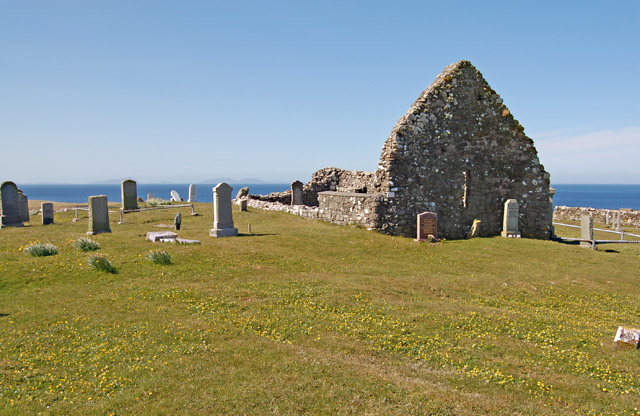Battle of the Spoiling of the Dyke

Trumpan Church, or Kilconan Church as it was once known, sits just east of the shores of Ardmore Bay on the edge of the Waternish peninsula, has a dark and bloody past.
On the first Sunday of May in the year of 1578 a raiding party of MacDonalds from Uist glided silently around Dunvegan Head into Ardmore bay on the isle of Skye, unnoticed by anyone and bent on vengeance. It was a Sunday morning, and many of the people had gone to worship in the local church. Slowly and silently the MacDonald men moved in on the building and piled brushwood against the door of the building and set it alight, trapping all who were within the walls.
Picture the dismay of the worshippers when there is a loud shout at the church door, and they turn to see the door guarded by armed men, triumphant and without pity. Escape is impossible. Resistance is useless, for the men are unarmed in the church. As the congregation stand there, the women and children terrified, the men defiant yet powerless against the claymores that guard the narrow door, wisps of pungent smoke enter the church and soon the crackle of flames is heard. Shrieks and wailings echo through the doomed building, while outside a piper plays wild and scornful music to drown the cries of the dying. Unperceived in the dense smoke, a teenage girl manages to squeeze through a narrow slit at the corner of the church severing one of her breasts in the process.
She managed to warn the MacLeod’s in Dunvegan. Waving the famous Fairy Flag, an army of MacLeods wreaked their revenge in a swift and bloody savage counter attack. Every member of the raiding party was slaughtered as they couldn't sail to freedom as the tide was so low they could not launch their boats. The battle was named the ‘Battle of the Spoiling of the Dyke’ (’Blar Milleadh Garaidh’ in Gaelic) so called because, when all was over, the corpses of the MacDonalds were dragged off and thrown at the side of a stone and turf dyke whereupon the dyke was simply toppled over the dead MacDonalds, so heinous was their act of butchery that it was deemed they did not warrant a decent burial.
It is said that for many years after the battle the bones of the dead MacDonalds could be seen sticking out from the toppled dyke, a gruesome reminder of an awful event.
It’s hard to imagine standing here today that a peaceful congregation gathered together in a church, a place of sanctuary, supposedly, and every man, woman and child being slaughtered. It's even harder to imagine when you stand here listening to the wind and a few distant seabirds that this slaughter actually happened. Now we have to ask ourselves, did the MacDonalds just go about setting fire to churches full of MacLeods?
Or was there more to this story? For a number of years there had been continuous feuding between Clan MacDonald and Clan MacLeod.
During the winter of 1577, this feud came to a terrible climax on the Isle of Eigg. The tradition runs that a small party of MacLeods had landed on that island, whereupon some of the MacLeods staying on the island became too amorous with the local maidens. They were seized, bound hand and foot, and set adrift in their own boat, but managed, to reach Dunvegan. Forthwith, to avenge them, the MacLeod Chief sailed for Eigg. Seeing his overwhelming force the inhabitants of the island, some three hundred and ninety five in number, took shelter in a great cave called St. Francis, also known as the Massacre Cave, which had a single narrow entrance. Their plan seemed successful.
Macleod searched the island, but failed to find them, and at last set sail. Looking back, however, the MacLeods spied a man on the top of the island. Returning immediately, by means of his footsteps in a sprinkling of snow which had fallen, they traced him to the mouth of the cave. There they demanded that the persons who had set their men adrift should be given up for punishment, or as we say in Scotland, "A square go". This was refused whereupon MacLeod ordered his men to gather huge amounts of heather and brushwood.
This was piled against the mouth of the cave and set on fire, Their intention, apparently, was to drive the MacDonalds out into the open but as they could not pass the flames at the cave entrance, none of the MacDonalds managed to escape and the blaze was kept up until all within were suffocated to death. Several centuries later the bones of those who perished were gathered together and reverently interred. Only one family escaped the massacre because they had taken refuge in a different cave.
When news of this slaughter reached the MacDonald chief, the outcry of the clan could be heard for miles around and they in turn, then planned their awful revenge on the MacLeods. This tit for tat mentality went on as almost a way of life until these two clans until 1601 when they finally ceased to wage war on each other after one final and bloody conflict on Skye at Coire ne Creiche in the Cuillins..

